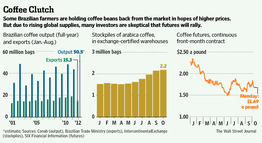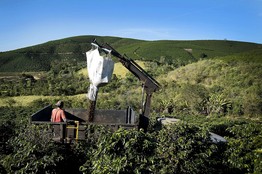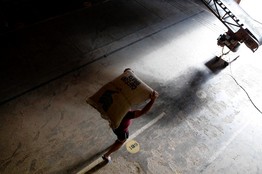Coffee has been trickling out of No. 1 supplier Brazil more slowly than usual this year. The Brazilian government estimates that the annual coffee harvest that wrapped up last month is a record, but the South American country's exports are down on the year. The reason: Farmers haven't been happy with prices, which hit two-year lows in June.

But big coffee buyers like Folgers-maker J.M. Smucker Co. are in no rush to buy. Global stockpiles of arabica beans, the coveted variety used in gourmet blends, are at their highest level in more than two years. Meanwhile, coffee demand is slowing due to the woes in Europe and more supplies are expected in the coming months.
The situation stands in contrast to 2011, when coffee roasters and food companies were scrambling to secure supplies amid a shortage of beans that drove prices to 14-year highs.
The result is a "tug of war" between buyers and sellers, said Hector Galvan, a senior broker at R.J. O'Brien Futures in Chicago. "The coffee's there, but it's just not moving."

Roasters that produce most of the coffee that ends up in tins and jars on supermarket shelves are heavily reliant on Brazilian beans. But even with some growers there holding back, companies don't appear to be short.
"We have sufficient supply to meet our production demands across our coffee portfolio," said a spokeswoman for Smucker.
Traders' anticipation of Brazil's big crop sparked a selloff in the first half of 2012, making coffee one of the worst-performing commodities.
The falling prices benefited coffee drinkers, though, who saw lower retail prices on supermarket shelves.
The selloff was an unwelcome jolt to farmers used to last year's multiyear highs. And many are holding onto some of their harvest in response.
Brazil's arabica-coffee exports are down 17% through September. This is the first year since 2008 that exports haven't risen year on year over that time period. Brazil this year produced an estimated 50.48 million bags of coffee, according to Brazil's government crop agency Conab.
But some investors say time is running out for Brazil's farmers. Growers in Colombia and Central America are gearing up for their harvest, which will add millions of bags of coffee to the market.

Bill Collard, president of Futures Management Group in Fern Park, Fla., started betting on falling coffee prices when futures got up to $1.75 a pound last week. "There's a lot of harvest pressure," Mr. Collard said. "It will be producer selling" that puts a lid on any price increases.
For now, though, farmers like 34-year-old Diogo Dias Teixeira de Macedo are holding their ground. "We've sold about 20% of production so far," said Mr. Teixeira, who farms 220 hectares of coffee in the mountains of southeastern Brazil. "At this time, we'd normally have sold 50%."
Futures have risen as much as 27% from June's two-year low of $1.4920 a pound, a rally that analysts and traders attributed partly to Brazilian farmers' reluctance to release supplies.
Arabica coffee for delivery in December on ICE Futures U.S. settled Monday at $1.6910 a pound, up 0.6%, or 1 cent on the day.
Gourmet-coffee roasters once viewed Brazilian beans as an afterthought, a low-cost staple used to round out the flavor of more powerful varieties. But Brazil's coffee has gained popularity in recent years as quality improved. Starting with the March 2013 contract, some Brazilian beans can be used to fulfill futures contracts, a sign of widespread acceptance.
Mr. Teixeira can afford to wait because a government-managed coffee fund offers loans to farmers so they don't have to sell coffee right away to pay their bills.
To be sure, Colombia and Central America's harvests could put less pressure on prices than some traders anticipate.
"We are now getting ready to price in a substantial [global coffee] deficit" because Brazil's harvest next year is likely to be smaller than this one, said Shawn Hackett, president of brokerage and consultancy Hackett Financial Advisors. Brazil has a biennial coffee cycle with alternating years of higher and lower output. Mr. Hackett has placed bets that prices of coffee for December delivery will rise and expects prices to hit $2 a pound by year-end.
But others believe Brazilian supplies will make their way out of local warehouses sooner rather than later, driving prices down. John Rich, a broker at Sarasota Futures, recently made an options bet on coffee prices staying below $1.85.
Once selling by Colombia and Central America begins, Brazil's farmers who have been holding out are likely to follow suit, said Spencer Patton, founder of Steel Vine Investments in Nashville, Tenn. "I don't expect that the play is going to pay off for the Brazilian farmers that are holding onto their crops.





